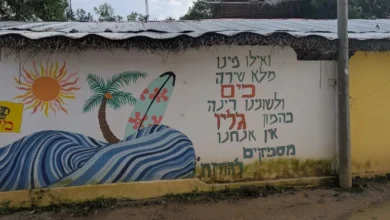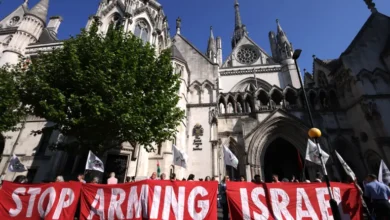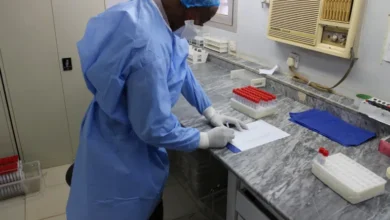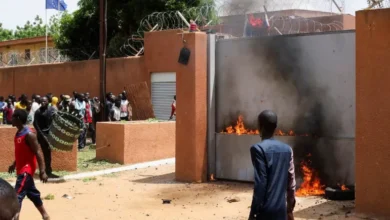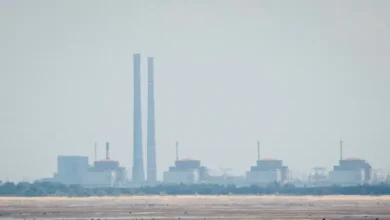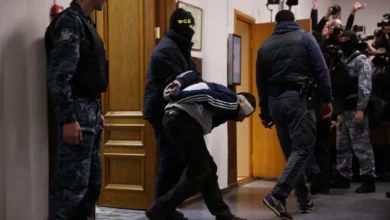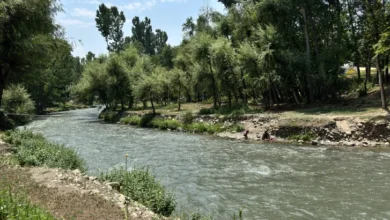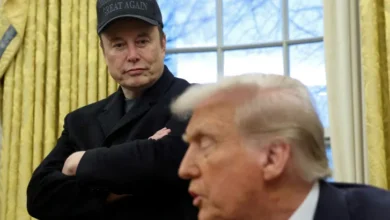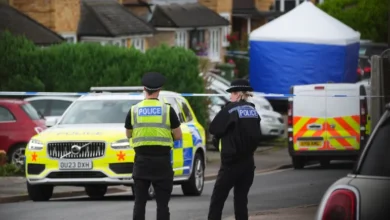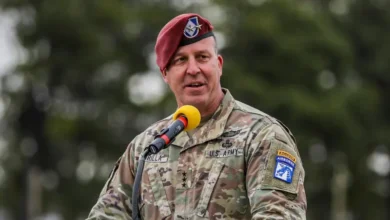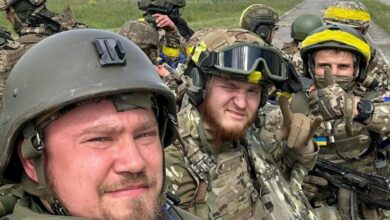Nasrallah says not afraid of war after Beirut attack
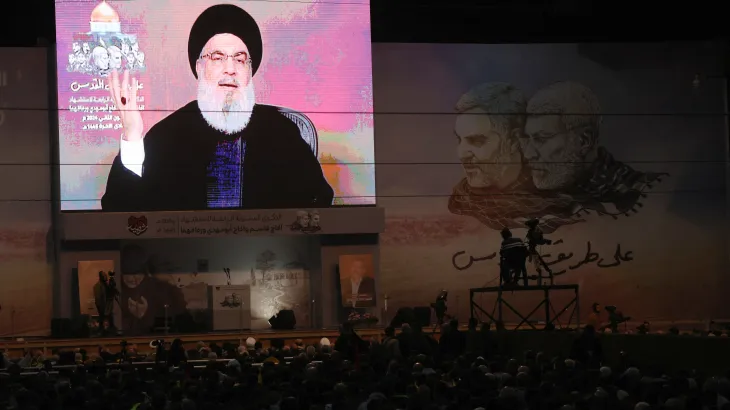
- Hezbollah leader Hassan Nasrallah says the Lebanese group is not afraid of war, but avoided any declaration that his forces would escalate attacks against Israel, in first speech since killing of Saleh al-Arouri.
- Hamas deputy leader al-Arouri was killed, along with six others, in a drone strike in southern Beirut, a Hezbollah stronghold. Israeli has not claimed responsibility.
Qatari aircraft carrying aid for Gaza arrives in Egypt
The plane carrying 37 tonnes of aid for Palestinians in Gaza arrived in El Arish, the Qatari foreign ministry has said.
The aid includes shelter kits and food items that will be further transferred to Gaza.
Wednesday’s aircraft delivery brings the total amount of aid planes sent from Qatar to Gaza to 58, with a total of 1,814 tonnes of aid.
US talks up ‘significant force presence’ in Middle East
White House national security spokesperson John Kirby has said that the US is beefing up its military assets in the waters of the Middle East to protect its forces, allies and international trade.
“To accomplish these goals we have established and will continue to maintain a significant force presence in the Middle East,” Kirby told reporters.
He said the Pentagon now has more than 4,000 troops and 50 aircraft in the eastern Mediterranean. Additionally, Kirby said the US and its allies are bolstering their forces in the Red Sea to thwart Houthi attacks on commercial ships.
“The United States does not seek conflict with any nation or actor in the Middle East, nor do we want to see the war between Israel and Hamas widen in the region, but neither will we shrink from the task of defending ourselves, our interests, our partners or the free flow of international commerce,” Kirby said.
Earlier in the day, Hezbollah leader Nasrallah said “resistance movements” in the region are not deterred by the US military threats.
US continues to hit out at Houthi Red Sea attacks
The United States has continued to say that the Houthis are threatening freedom of navigation in the Red Sea, but it remains unclear what capacity the US has to crack down on the raids.
“We have this joint statement from the governments of US, Australia, Bahrain, Belgium, Canada, Denmark, Italy, Germany, Japan, the Netherlands, New Zealand, and the UK talking about this broad consensus against the Houthi attacks,” Al Jazeera correspondent Shihab Rattansi reported from the US State Department in Washington, DC.
“But right now, there are still so many questions about what exactly the US has organised under this umbrella of Operation Prosperity Guardian,” he added.
US says wasn’t given notice of assassination of al-Arouri
State Department spokesperson Matthew Miller says that Israel has neither confirmed nor denied that it carried out the strike on Beirut that killed Hamas’s deputy commander yesterday.
Miller called al-Arouri “a brutal terrorist with civilian blood on his hands”, and said that the US is very concerned about the Israel-Hamas conflict spreading to the wider region.
UK’s Cameron says more humanitarian aid must be allowed into Gaza
The UK’s foreign secretary has said that Israel must allow more supplies into Gaza to decrease the risk of hunger and disease, as humanitarian groups warn that the possibility of large-scale starvation is stalking the Gaza Strip.
“More must be done to get humanitarian aid into Gaza – Israel must allow significantly more supplies in to reduce the risk of hunger and disease,” David Cameron said in a post on social media site X.
“The UK also wants to see the immediate release of hostages and progress towards a sustainable ceasefire.”
85% of people in Gaza begin 2024 in state of displacement: UN
The UN Office for the Coordination of Humanitarian Affairs (OCHA) has lamented the mass displacement of Palestinians in Gaza and the conditions facing the majority of the enclave’s 2.3 million people who have been forced from their homes.
UNOCHA said that most of those displaced are “squeezed into extremely overcrowded spaces” and that “the spread of diseases has intensified, putting a strain on an already overwhelmed health system that is struggling to meet immense needs”.
‘Hezbollah is in a very difficult position’
Hassan Nasrallah repeated that more than once: national and strategic considerations, the situation in Lebanon, the challenges that this country is facing. The economy has all but collapsed.
The international community is no longer helping a political class that it accuses of corruption. If there were to be a full-blown war, Lebanon would not receive any assistance. They know Israel’s abilities. Yes, Hezbollah has capabilities as well. He [Nasrallah] said that Hezbollah is not afraid and that it has long-range rockets.
But Israel can also destroy, for example, the southern suburbs of Beirut, where Hamas’s second-in-command Saleh al-Arouri was killed. Yes, it’s known as a Hezbollah stronghold but it’s also a place where half a million Lebanese live.
Supporters of Hezbollah – where will they go if Israel starts to bombard that area in Lebanon and level it like Gaza? We’ve heard Israeli officials threaten that the Gaza-like scenario will be implemented in Lebanon. These people have no place to go.
Hezbollah’s response to Israel will be tit-for-tat: AJ analyst
It is going to respond to the killing of al-Arouri because it promised that it will respond.
As Hassan Nasrallah said, this cannot go unanswered. Eventually, Hezbollah will probably choose the time and the place to respond to such a blatant Israeli attack against the sovereignty of Lebanon and the killing of Hamas leaders.
There’s a bit of a revisionist history that we heard from Nasrallah about Iran’s role in the region, Iran’s role in Iraq, Iran’s proxies’ role in Iraq, in Afghanistan. I’m not sure it’s accurate on the part of Nasrallah.
But Israel and the United States are facing an “axis of resistance”, which is present in Iraq, in Syria, in Lebanon, in Palestine, in Yemen and in other places – basically a network of resistance movements and militias that have been supported and aided by Iran.
Hezbollah is saying that Iran is the patron of all these movements that make up a network, and yet, these movements do not take orders from Iran – they act independently. I think he needed to emphasise that in order to say if Lebanon acts, it won’t be by order of Tehran. If the Houthis in Yemen act, it won’t be by order of Iran, and the same thing for Hamas.
